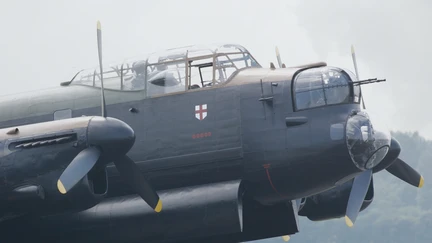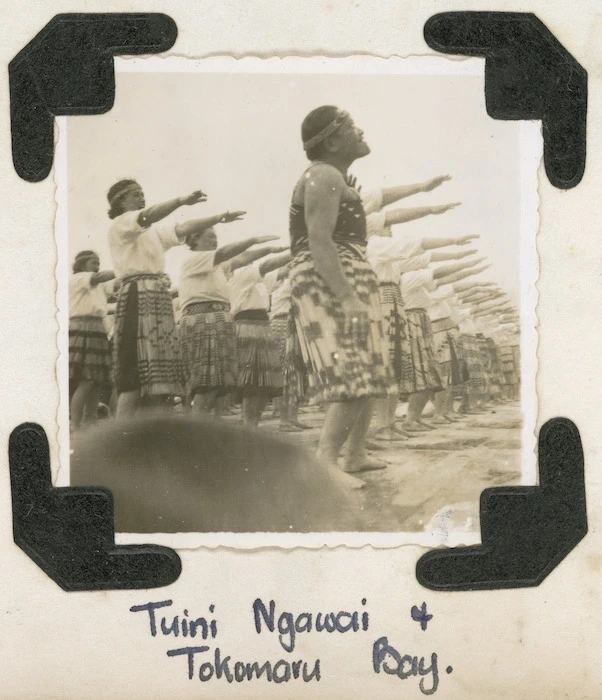Ngāi Māori i te Pakanga Tuarua o te Ao - Māori in the Second World War
Discover stories of Māori in World War II. Listen and watch videos and recordings of iconic waiata of World War II.

Discover their stories
Websites
- Second World War: the Māori war effort – Te Ara Encyclopedia of New Zealand
"Māori made a sustained and valuable contribution to the armed forces during the Second World War. When war was declared many volunteered immediately for the 2nd New Zealand Expeditionary Force (2NZEF), and some left New Zealand with the 1st Echelon in January 1940."
"There would be men of Māori descent in all of the infantry battalions throughout the war, while numerous Māori volunteers were spread throughout the other services." - Māori and the Second World War - NZHistory.net
"By the time the Second World War ended in 1945, 28 (Maori) Battalion had become one of the most celebrated and decorated units in the New Zealand forces. The pinnacle of its achievement was the Victoria Cross won by Te Moananui-a-Kiwa Ngārimu in 1943. Ultimately, nearly 16,000 Māori enlisted for service during the Second World War."
28th Māori Battalion
"Between 1941 and 1945, New Zealand's 28th (Māori) Battalion forged an outstanding reputation on the battlefields of Greece, Crete, North Africa and Italy. This site is dedicated to the men who served with the Māori Battalion and to their whānau and friends."
28th Māori Battalion — Official Website
From NZ On Screen:
- Māori Battalion - March to Victory (NZ On Screen)
Watch this full length television documentary from 1990, now available online:
"Māori Battalion - March To Victory tells the story of the New Zealand Army's (28th) Māori Battalion, which fought in campaigns during World War ll. Director and writer Tainui Stephens sets out in the feature-length documentary to tell the stories of five men who served with the unit, and also 'capture how they felt about it'." - Weekly Review No. 232 - Māori Battalion Returns (NZ On Screen)
"This post war [1946] newsreel features footage of Māori Battalion solders returning from WWII onboard the ship Dominion Monarch, into Wellington Harbour. The soldiers are greeted with a huge pōwhiri and ensuing hākari at Aotea Quay where the kaimoana and pia flow freely."
He Waiata -
Māori Battalion March to Victory / Sergeant Anaia Amohau
"Maori Battalion March to Victory, composed by B Company's Anania (Nan) Amohau and set to the music of an American marching song, became the Battalion's rallying cry..."
28th Māori Battalion Official Website — 'Band Plays Māori Battalion March to Victory'
- Photo of Anania Amohau, composer
- Recording: Nga Pao me nga Pakiwaitara a te Iwi Māori, from Ngā Taonga Sound & Vision
"Ulric Williams presents a programme of songs by the 2nd [Reinforcements of the] 28 Māori Battalion, recorded in their camp in North Auckland in New Zealand during World War II. [...] [Includes] "Māori Battalion March to Victory" - sung in English and Māori, conducted by its composer, Sergeant Anaia Amohau.
Blue Smoke / Ruru Karaitiana, sung by Pixie Williams
"'Blue Smoke' was the first song written by a New Zealander to be recorded and manufactured in New Zealand – and released on a New Zealand record label. [...] 'Blue Smoke' was written in May 1940 on board the Aquitania, the troopship taking the Māori Battalion to the Second World War. Among the soldiers in D Company was a dance band leader and multi-instrumentalist from Dannevirke, Private Ruru Karaitiana..."
'Blue Smoke' article by Chris Bourke for Audioculture
- Story: Karaitiana, Rangi Ruru Wānanga — Dictionary of New Zealand Biography
- Pixie Williams sings 'Blue smoke' (Audio) — Te Ara
- Discovered: the earliest-known recording of significant NZ song 'Blue Smoke' — RNZ
- Blue Smoke — New Zealand's first record, via NZHistory.net
- Our post: 'Pixie Williams: The Voice of Blue Smoke'
Arohaina mai / Tuini Ngawai
"This is regarded as Tuini Ngawai's greatest composition. She wrote it when the men of C Company, 28th (Maori) Battalion were departing from the East Coast for the battlefields of World War II."
New Zealand Folk Songs Website
- Recording and lyrics: Uepohatu reunion - song 'Arohaina mai ra', from the Māori Battalion Website
- 'Arohaina mai' — New Zealand Folk Song Website
- Waiata hōu – contemporary Māori songs, Second World War to Cultural Renaissance
- Story: Ngāwai, Tuini Moetū Haangū — Dictionary of New Zealand Biography
- Tuini Ngāwai - Audioculture Biography, with lots of resources

Johnson, Owen. Mackrell, Brent fl 2012: Photographs. Ref: PA1-o-1038-09-6. Alexander Turnbull Library, NZ. /records/23217872
The Tokomaru Bay party led by Tuini Ngawai at the V.C. hui at Ruatoria in 1943.
E te Hokowhitu-a-Tu / Tuini Ngawai
"This song has been popular since the Second World War when the young men of the Maori Battalion were away fighting in North Africa and Italy."
New Zealand Folk Songs Website
- Recording and lyrics: Ngarimu VC investiture, part 19 - 'Te Hokowhitu a Tu', from the Māori Battalion Website
- Ngā Taonga Sound and Vision — New Zealand Māori Company Concert Recording
- 'Five Songs by Tuini Ngawai', Te Ao Hou, April 1956, Page 48 — includes translation
Au, E Ihu / Padre Wiremu Te Tau Hūata
"A well-loved hymn of the Māori people. It was sung by the men of the 28th (Maori) Battalion before they went into battle, and at the battle's end. It is No. 94 in the Anglican Maori Hymn Book."
New Zealand Folk Songs Website
- Recording and lyrics: Hymn: Au, e Ihu, from the Māori Battalion Website
"The Māori Battalion with the 2NZEF recorded a Christmas programme from the Middle East on 15 October 1942. This is part of the hymn "Au, e Ihu" sung for the occasion by members of the Māori Battalion." - Māori Chaplains, remembrances — from the Māori Battalion website
"This article appeared in the April 1984 The Battalion Remembers booklet." Includes remembrances from Padre Wi Huata and others.
Italian and German songs
"In contrast to the sparsely populated North African desert, Māori soldiers in Italy had far more interaction with the local population - especially during the seven months the Battalion spent there after the fighting ended. Māori picked up the language easily, and Italian songs like 'Buona Notte Mio Amore' became part of the Battalion's repertoire. Many Māori felt at home among the warm-hearted Italian country folk, and some formed relationships with local women. More than a few tears were shed when the Battalion finally departed Italy in December 1945."
Life in the Battalion — Māori Battalion Website
The popularity of the Italian songs was due to the influence of the time 28 Battalion spent in Italy in World War II. Several "tenors" of Rotorua became very consumed by the Italian waiata — Sir Howard Morrison, Joshua Gardiner, Bill Kingi, George Bennett and Hohepa Mutu are an illustration of the handed down influence of Italian waiata on 28 Māori Battalion members, sung at home and passed on:
"Morrison's introduction to music included listening to veterans of 28 (Māori) Battalion sing Neapolitan songs at parties, Sunday hymns at church, and the weekly Lifebuoy Hit Parade radio programme. He enjoyed mimicking the songs and learning to sing harmonies."
Story: Morrison, Howard Leslie, DNZB
Watch a video below of The Howard Morrison Quartet Take Two — formed with Sir Howard Morrison's son, Howard Morrison Jnr, singing some of these songs in a tribute:
Buona Notte Mi Amore
- Video: Nolan Raihania - Singing the song 'Buona Notte'
- Italy and 28th Māori Battalion: 'Love of language, love of life' — Radio New Zealand
"'Buona notte mi amore' was one of many songs the Italians taught Māori soldiers during the second world war"
Other songs - 'O Sole Mio', 'Mama' and 'Lili Marleen'
- Nolan Raihania sings 'Mama' — Māori Battalion Website
- Huata, Wiremu Te Tau – Dictionary of New Zealand Biography – Te Ara (see above)
"Like many of the battalion he learnt Italian, especially Italian songs; he was famous for his rendition of romantic songs such as 'Buona notte mio amore', and decades later would sing them at battalion reunions and after memorial services." - Maisey Rika sings 'Lili Marleen' for her koroua on Anzac Day
Maisey says Lili Marleen is a song her koroua brought back with him from Italy where he had served with B Company of the 28 (Māori) Battalion and would often sing to his whānau:
I roto i tō mātou whānau he momo tāonga tuku iho. Ka whakaakongia ki āna tamariki, i reira mātou ngā mokopuna e whakarongo ana ki a mātou mātou mātua e waiata ana. Ko tēnei tētahi o ngā tino waiata nā te mea i kawea mai i te pakanga."
(Translation: This song is very much a treasure within our whānau. Our koroua, Tommy, taught all of his kids this song and us grandkids would listen to our parents singing it. It is one of our favourite songs of his because he brought back with him from the war.)
More Resources Online
Discover more photos, videos and stories online here: Digital NZ: Māori and the Second World War.